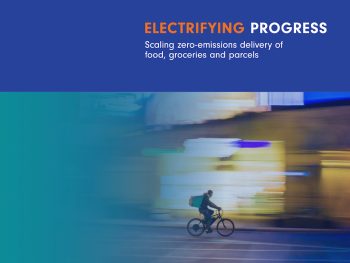New study sets strategies for delivery sector to scale fleet electrification
A new study that identifies successful strategies for the global transition to electric-powered delivery vehicles is now out.

The study examines how the delivery sector can scale the electrification of vehicles and reduce the environmental impact of operations
Authored by global consumer internet group Naspers Prosus and supported by AI platform Ubuntoo, the ‘Electrifying Progress’ report calls for stakeholder collaboration for industry across the globe.
The study examines how the delivery sector can scale the electrification of vehicles and reduce the environmental impact of getting food, groceries and parcels to consumers’ homes.
Up to 50% of carbon emissions associated with delivery can be traced back to the ‘last-mile phase’. Research estimates this phase results in annual emissions of almost 8 million tonnes of GHG across India, Europe and the United States.
Global demand for last-mile delivery is set to increase by 78% by 2030, with a 36% rise in the number of delivery vehicles in the world’s top 100 cities. This increase would see a potential rise in GHG emissions by 32% if there is no intervention. But the electrification of delivery can also mitigate localised air quality issues and improve the livelihood of delivery drivers.
Ensuring cost-effectiveness is essential for the widespread adoption of EVs in delivery, according to the study – which also highlights that facilitating practical application of EVs through suitable charging infrastructure and range of vehicles is key.
Public acceptance is a third pillar of change identified by the report, after analysing qualitative data from global companies in the sector and other stakeholders in the EV industry.
The report lists strategies for delivery operators to support the adoption of electric vehicles in commercial deliveries and portrays initiatives of successful businesses as they switch to electrification within their operations.
It also highlights the need for political will and regulatory support to drive faster uptake of electric vehicles, alongside technological innovation and private sector initiatives.
Prajna Khanna, global head of sustainability at Naspers Prosus group, said: “Our research has shown that to deliver an effective decarbonisation of delivery systems, concrete government action is essential. In addition, accessible financial incentives will help to create trust and confidence for entrepreneurs and companies that are the agents of change. It’s now time for policymakers to take action to support this transition.”
Peter Schelstraete, co-founder at Ubuntoo, continued: “We are proud to have supported the research behind this seminal report, putting our cutting-edge AI platform to work and combining it with world-leading human expertise. The future is electric, and the planet demands that every country now gets on board with the transition.”
To view the full report, please click here.
Delivery fleetsElectric delivery fleetsLast-mile deliveriesNaspers ProsusUbuntoo







